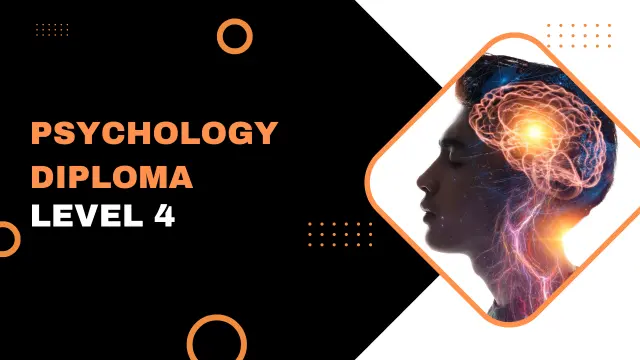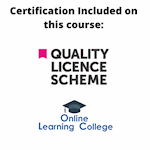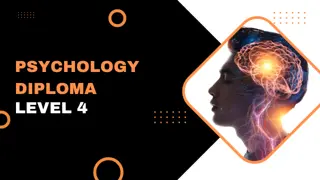
Psychology Diploma Level 4
Online Learning College
Summary
- Certificate of completion - Free
- Tutor is available to students
- TOTUM card available but not included in price What's this?
Add to basket or enquire
Overview
Psychology is a very complex science and this course is a great way to further your understanding of psychological concepts and how the mind works. The course covers a number of different units and is perfect for anyone looking to gain a good knowledge of a very fascinating area of science.
Certificates
Certificate of completion
Hard copy certificate - Included
Course media
Description
About this course
Through this Psychology Level 4 course learners will gain a deep understanding of how the mind develops, is shaped and deals with certain external factors. The course is designed for anyone with a background in Psychology looking to take the next step up and gain a Level 4 course which gives a deep understanding into this area of science.
Study Time: 120 hours
Enrolment Length: 12 months
Course Format: Online
Entry Requirements: None specific
Upon completion of this course students receive a Quality Licence Scheme certificate and an OLC Certificate. All certification fees are included in your course fees.
Certification
To complete this Psychology Level 4 course you will need to submit, and pass, all of the tutor marked assignments. There are eight assignments in the course and no need to purchase any textbooks as we provide all of the lessons and materials required to learn the syllabus.
All assignments are coursework based and are in an essay/question and answer style to test your knowledge of the topics covered in each of the course sections.
Method
All of our students are given access to our online campus through their own personal login and password. Once logged in you can access your course materials, lessons, resources and assignments in your own time. Assignments are uploaded through your account and the process is easy intuitive. Our online campus includes:
- 24/7/365 access to all of your course materials- all lessons, assignments and resources are available from the moment you enrol
- Instant access to your course after you enrol- start studying immediately!
- Integrated chat and messaging systems so that you can contact your tutor
- Online assignment uploads to save time in returning marks and feedback.
- Links to further resources and information available on courses
- Self-led learning on all courses- study in your own time and work through your assignments at your own pace
- Safe e-portfolio of your work is kept under lock and key on our secure servers
- Progress bar to show the work you have completed and how many tasks you still have to complete on your course
- Detailed help centre with step-by-step instructions on getting the most from your course and how to upload assignments and contact your tutor
Enrolment Length
All of our courses are allocated plenty of time for students to complete their studies and all materials are self-led so that you can complete the course at your own pace. Should you require additional time on one of our courses you can extend your enrolment by 30 days for an additional fee of £60.
As well as this we operate a 14 day money back guarantee on every one of our courses- that’s how confident we are of how you will love studying with us!
Assessments
To pass this course learners must complete a number of assignments. These are completed after navigating through the lessons which are sent to students and writing your answers to assignment questions. Once these have been read and marked by your personal tutor, feedback and marks are provided to students which contain helpful tips to improve work in future assignments.
Course Content
This course assesses the following units:
Unit 1: Defining psychology and history
- A short history of psychology
- Classification of psychology
- Psychology practice and approaches today
- Major themes in psychology
Unit 2: Research methods in Psychology
- Ethical considerations
- Design and implementation
- Experimental and non-experiments methods
- Qualitative and quantitative analysis
- Presenting data
Unit 3: Psychological abnormality
- Defining abnormality
- Models of abnormal psychology
- The diagnostic and statistical manual of mental disorders
- Schizophrenia
- Depression
- Personality/anxiety disorders
- Psychotherapy treatments
- Ethical issues
Unit 4: Behaviour and experience
- The central nervous system
- Sensory processes and awareness
- Addictive behaviour
- Motivation
- Emotion and stress
Unit 5: Cognitive psychology
- Perception
- Attention
- Language
- Memory
- Models of thought
Unit 6: Social psychology
- Social perception and prejudice
- Attribution theory
- Prejudice, stereotyping and discrimination
- Relationships
- Conformity and power
- Groups and group behaviour
- Prosocial and antisocial behaviour
Unit 7: Comparative psychology
- Evolutionary behaviour
- Reproduction
- Social behaviour, imprinting and signals
- Analysis of behaviour
Unit 8: Developmental psychology
- Early social development
- Cognitive development in children
- Moral, gender and self development
- Adolescence to old age
- Major life events
Support
The most important tool that all of our students have at their disposal is their tutor. When studying for a course with us you are assigned a personal tutor with indepth knowledge and experience in your chosen subject.
You are strongly advised to make use of your tutors expertise and ask questions about the course content. Your assignments are marked by your personal tutor and detailed feedback is given. As well as this your tutor will provide you with pointers and advice on where you can improve- this helps you to get the most from your courses and constantly improve your skills.
Who is this course for?
For those who are looking to gain a better understanding of how the mind develops
Requirements
No requirements
Questions and answers
Currently there are no Q&As for this course. Be the first to ask a question.
Reviews
Currently there are no reviews for this course. Be the first to leave a review.
Legal information
This course is advertised on reed.co.uk by the Course Provider, whose terms and conditions apply. Purchases are made directly from the Course Provider, and as such, content and materials are supplied by the Course Provider directly. Reed is acting as agent and not reseller in relation to this course. Reed's only responsibility is to facilitate your payment for the course. It is your responsibility to review and agree to the Course Provider's terms and conditions and satisfy yourself as to the suitability of the course you intend to purchase. Reed will not have any responsibility for the content of the course and/or associated materials.




